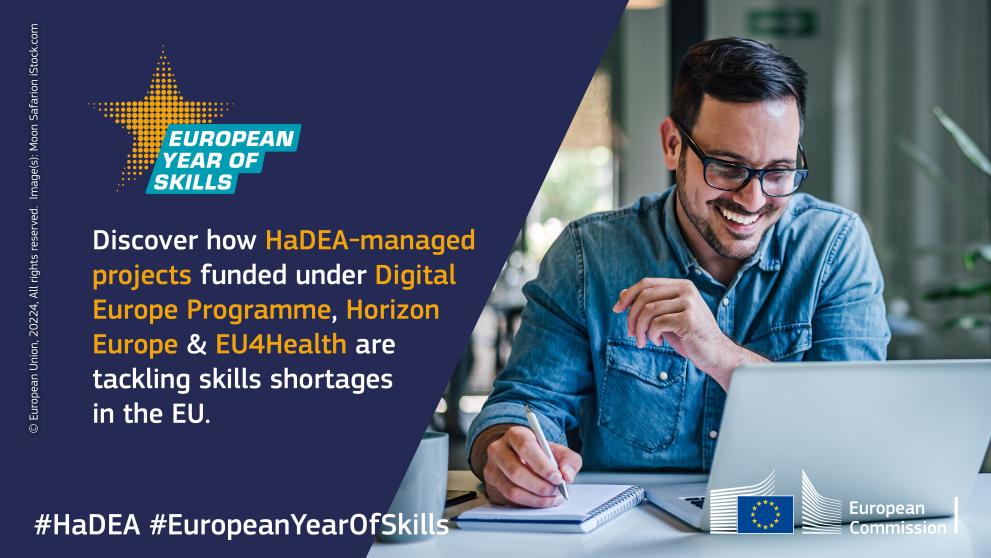
During the European Year of Skills, which began on 9 May 2023, skills-related activities have been taking place across Europe with the objective of tackling the EU's skills shortages and enhancing competitiveness.
Supporting the European Year of Skills, HaDEA implements several EU programmes contributing to skill development. Digital Europe Programme has funded initiatives aimed at upskilling the existing workforce through specialised education programmes and short trainings in key capacity areas. Capitalising on the foundation laid by Horizon 2020, Horizon Europe, further enhances skills for researchers, entrepreneurs, and innovators, contributing to a skilled workforce in both the industrial and scientific sectors. EU4Health Programme allows for synergies for the upskilling of healthcare and public health workforces.
Some examples of projects funded by the these programmes are listed below:
- DIGITWIN4CIUE (DIGITAL) is fostering digital transformation across the civil engineering and construction sectors in Europe. It comprises two main components:
- Master’s programme in Digital Twins for Infrastructures and Cities, which focuses on providing training in relevant digital skills, such as IoT, AI, and data analytics.
- Creation of a European Centre of Excellence to accelerate the digital transformation of the civil engineering and construction sectors in Europe. It serves as a hub for innovative research, collaboration with the industry, and knowledge-sharing, bringing together experts from academia, industry, and government.
- INTERACT-EUROPE (EU4Health) project promoted a patient-centric approach to quality cancer care by encouraging multidisciplinary and multi-professional teamwork. The project advanced the knowledge and understanding that different professions involved in cancer care had of each other and raised awareness of the need for an inter-speciality cancer training programme in Europe. Healthcare professional organisations participating in the project developed an inter-speciality cancer training curriculum for an inter-specialty training programme focused on clinical oncology, surgery, radiology and nursing services, encompassing 127 competencies, and in accordance with the CanMEDS framework for improving patient care by enhancing physician training. The project championed the creation of a pioneer cohort of trainees, from across Europe, marking a pivotal step in reshaping oncology education. As a result, the project has laid the foundations for the continuous evolution of interdisciplinary cancer care in the EU. The successor project, INTERACT-EUROPE 100, which aims to convert the curriculum into innovative learning resources and deliver inter-specialty cancer training in 100 cancer centres, started on 1 December 2023.
- CyberSecPro (DIGITAL) is developing examples of best practices for cybersecurity training programmes. It is working to enhance the role of the EU Higher Education Institutions (HEIs) in offering hands-on and working-life skills for driving a trustworthy digital transformation in critical sectors of the economy. CyberSecPro is developing flexible and multi-lingual education and training modules (e.g. courses, ad-hoc seminars, summer schools, workshops, cyber exercises, hackathons, and cyber games) in specific knowledge areas such as Cybersecurity Threat Management, Emerging Technologies and Network and Communications Security among others. 48 training modules will be offered by more than 12 EU academic institutions with more than 530 trainees.
- GenoMed4All (Horizon Europe) is a European initiative to transform the response to haematological diseases by adopting groundbreaking and trustworthy AI algorithms, and standardised interoperable sharing of cross-border data. GenoMed4All in collaboration with ERN-EuroBloodNet offer an educational programme on Artificial Intelligence and its applications in haematology, which targets the public-at-large and aims to increase awareness on the cutting-edge advances on Artificial Intelligence for the diagnosis, treatments and follow-up of three different rare haematological clinical domains. The programme consists of a cycle of four webinar provided by key experts in the field.
- Up-Skill (Horizon Europe) addresses workforce implications of Industry 5.0, specifically the relationship between automation and maintenance of skilled work. It is working to deepen understanding of the ways in which businesses, especially those in the industrial and manufacturing sectors, can benefit from integrating human and machine capabilities. In terms of production, it explores where automation adds value to skilled and artisanal work and where over-automation undermines the value of what is produced.
Background information
The Digital Europe Programme (DIGITAL) aims to build the strategic digital capacities of the EU and to facilitate the wide deployment of digital technologies. With an overall budget of €7.5 billion, out of which €0.8 billion is managed by HaDEA, the programme will support investments in the area of ‘Advanced Digital Skills’, aimed at contributing to the attainment of the ambitious target set by the Digital Decade and at supporting the EU education and training institutions in digital areas, also by encouraging their cooperation with research and businesses, in synergy with the actions put in place by EU countries, also in the context of their Recovery and Resilience Plans.
EU4Health, with a budget of €5.3 billion, is the fourth and largest of the EU health programmes. The EU4Health programme goes beyond an ambitious response to the COVID-19 crisis to address the resilience of European healthcare systems. The programme provides funding to national authorities, health organisations and other bodies through grants and public procurement, contributing to a healthier Europe.
HaDEA manages the vast majority of the total EU4Health budget and implements the programme by managing calls for proposals and tenders from 2021 to 2027.
Horizon Europe is the EU’s key funding programme for research and innovation with a budget of €95.5 billion. It tackles climate change, helps to achieve the UN’s Sustainable Development Goals and boosts the EU’s competitiveness and growth. HaDEA implements parts of Horizon Europe Clusters 1 (Health) and 4 (Digital, Industry, and Space). It was preceded by Horizon 2020.
Details
- Publication date
- 8 May 2024
- Author
- European Health and Digital Executive Agency
- Programme Sector
- Health
- Digital
- Programme
- EU4Health
- Horizon Europe
- Horizon Europe Cluster 4: Digital
- Digital Europe Programme
- Tags
- Digital transformation
- EUCancerPlan
